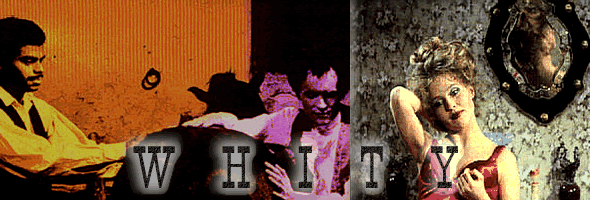
Even on the fifth viewing, Fassbinder's Whity (1970) gives me a sense of total dislocation. It's so hard to define its time and place--it avoids any attempt at pinning it down. Fassbinder works his magic in and out of the Western genre, mixing English slang with German dialogue, 19th century period costumes and 1970s glamour, and a soundtrack that references Morricone, Brecht and late '60s West Coast rock.
***

James Cagney plays a small-time, big-city gambler that hits it big: falling for Mae Clarke's scam and losing fifty bucks at a "nice, friendly game of cards," Cagney offers his services to her entourage, and together they make a killing off the city. All goes well until the killing becomes real and Cagney has to flee to California. Picking up the pieces as a Hollywood extra, he works his way to the top of the studios, only to be felled when his gang shows up wanting a piece of the action.
There's something a little raw about the humor of Roy Del Ruth's 1933 Lady Killer. Consider when Cagney returns home to his Hollywood mansion to find Clarke waiting in bed for him: in a single shot, he grabs her by the hair, and drags her across the room and into the hallway. Before the production code of 1934 (which upped the morals while lowering the morale), movies could get away with such brutality. Too, the bad guys could win. Such is how Cagney is implicated in murder, stealing, assault, theft, gambling and booze (the prohibition was on), and in the last frame still be on his way to Cuba to get married with his lover (guilty of the same crimes).
***

Anna Magnani carries Amore (1948) all on her own. The film, directed by Roberto Rossellini and scripted with the help of Federico Fellini, among others, comprises two short films. In the first, "A Human Voice," Magnani is the only actor on screen, save for a dog that is in no more than a few shots. Magnani is on the phone with her lover, far away and recently departed. This, it seems, is to be their last conversation. The second film, "The Miracle," was banned in the US and taken to the Supreme Court. Magnani plays a poor woman who meets a man in the woods one day who she takes to be Saint Joseph. He gets her drunk and, once unconscious, rapes her. Convinced that he was Saint Joseph, Magnani informs the town that her pregnancy was an immaculate conception. Ridiculed and run out of town, Magnani flees to the hills to bear her child alone.
The common theme seems to be one of faith, both secular and religious. In the first film, Magnani is dealing with her obsession for her lover, whom she shall never see again. Through the course of the conversation, she realizes that he has been lying to her: that he is not "at home" alone, and that he is cushioning the truth in order to make the separation easier. The facade breaks and her delusions fall away. Faith has to do with trust and fidelity, as well as our own projection of others, what they think and how they feel. In "The Miracle," the townsfolk and church do not buy into Magnani's tale, and they reject her own religious experiences. To them, she is a sinner, a liar, a whore, a hyprocrite, and a lunatic.
Communication, too, seems to be of concern. In "A Human Voice," the telephone is the only means of connection between the lovers, and the line keeps going dead--or does he hang-up? With the partner absent (literally, in the film, for even his voice is absent), so much is left to the imagination. And in the second--no one believes her. Her faith is ridiculed and since it doesn't conform to the mass's conception, then it is not accepted.
***

There is something cruel about Nicholas Ray's films, this inward hate that infests his characters. James Dean in Rebel Without a Cause, punching the desk, hoping that any expression of violence will curb its tendencies for the time being. Or Sterling Hayden in Johnny Guitar, the gunslinger who traded his pistols for the guitar, only to find his hand still goes for the nearest gun when trouble resounds. Too, in the same movie, Joan Crawford refuses to leave town, even though she knows the puritanical lynch-mob (headed by Mercedes McCambridge) is out to get her; when a young man accused of robbery is found hiding in her saloon by the mob, Crawford encourages the young man to lie and implicate her in the robbery if it would save him from the gallows. Self-destruction and circularity permeate Ray's films, with no easy exits provided.

No comments:
Post a Comment